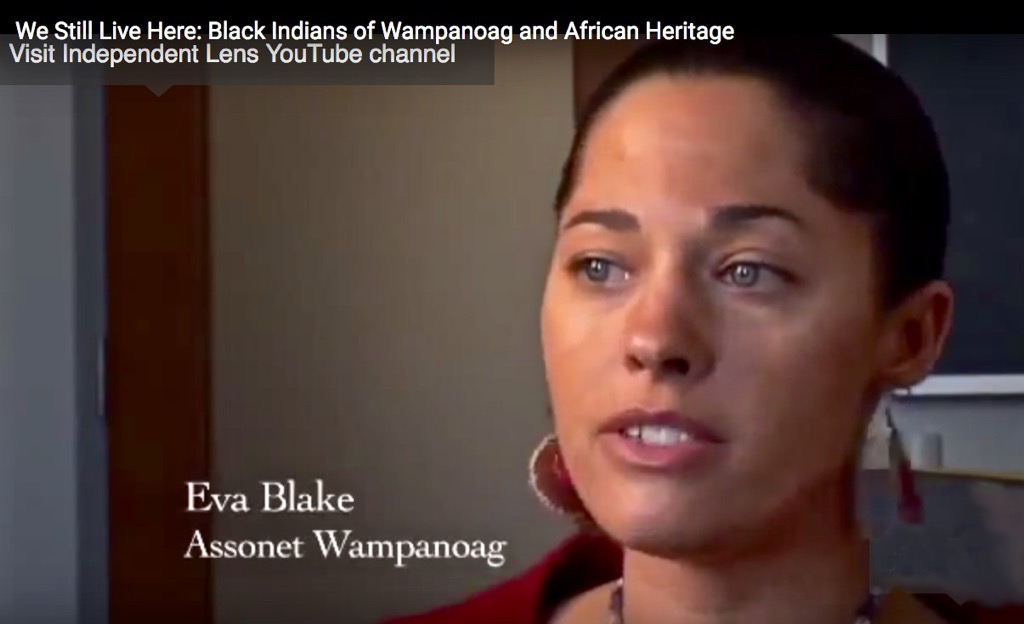Deneva has been researching Thanksgiving curriculum materials for our congregation, and she sent me a link to an online video titled “We Still Live Here: Black Indians of Wampanoag and African Heritage”:
This video poses a nice challenge to neat and tidy racial categories: if you look black, and grew up in a Wampanoag family, and speak Wampanoag, and identify more with your Wampanoag heritage than your African heritage, what are you? Obviously, from the point of view of the U.S. criminal justice system, you’d be non-white. But in terms of your racial and ethnic identity, surely you are a Wampanoag Indian. Such a conclusion challenges typical racial categories in the U.S., where there is a popular myth that both White and Indian are recessive genetic traits, swamped by even the slightest amount of non-white DNA — which implies that even the slightest bit of African heritage means you’re of African descent. And many of us in the U.S. cling to that old myth, even if we’ve taken a high school biology class and have basic knowledge of genetics. This reveals the power of myth over rationality.
But the best part about the video for me was listening to the regional accent. I miss speaking Eastern New England dialect.


Historically, being part of a tribe had nothing to do with race, but some tribes have adopted the concept of race, especially to deal with dispersing casino profits. As a result, the Cherokee have dispossessed black people who spoke Cherokee and lived a Cherokee lifestyle, and they’ve accepted people of Cherokee descent who didn’t know the language or the customs. It’s just a mess.
Interesting to hear about the Cherokee, Will. I used to live in southeastern Massachusetts, not far from the Mashpee Wampanoags, and that part of the U.S. still seems to me the most racially relaxed place I’d ever lived — obviously, there were the usual racial tensions you’d expect in the U.S., but they were not as vicious. (And southeastern Mass. has serious problems — high unemployment, alcohol and drug use, etc. — so I’m not holding it up as a Utopia.) So maybe the Wampanoag reflect that regional tendency; or maybe they’re the origins of that tendency.
The Cherokee have a complex history. The last Confederate general to surrender was a Cherokee, Stand Watie, and I think all of the black Cherokees who were kicked out of the tribe were descendants of slaves of the Cherokee. The influence of their white neighbors just wasn’t good for them.
Just checked. Apparently there’ll be a ruling on the legality of expelling the Cherokee freedmen this year. https://en.wikipedia.org/wiki/Cherokee_freedmen_controversy
I think I’d quibble a bit with the term “dialect” — there are certainly a few words and terms unique to New England that stand out (bubbler, wicked, pissah, etc.) but I’m not convinced this qualifies as “dialect.” There is a discernable accent, certainly, with the distinct non-rhoticity being foremost and most recognizable. But it seems a stretch to call this a dialect.
Just the English professor in me. You know.
Jean, see: William Labov, Sharon Ash, Charles Boberg, The Atlas of North American English: Phonetics, Phonology, and Sound Change (Walter de Gruyter, 2006), ch. 11, where Eastern New England English is treated as a dialect, based more on phonology than on vocabulary. Dialectical differences are not as strong in the U.S. as in, say, Great Britain, but linguists have identified quite a few U.S. dialects.
Wow. Super interesting. Maybe the big difference between the Cherokee and the Wampanoag is that the Wampanoag weren’t enslaving persons of African descent, they were marrying them.
Good resource, Dan. Still, it’s a stand alone work and in my view does mis-use “dialect.” But, just my view.